Existing User Log In
New User Registration
Register for a free account to gain full access to the VGChartz Network and join our thriving community.





America - Front


America - Back

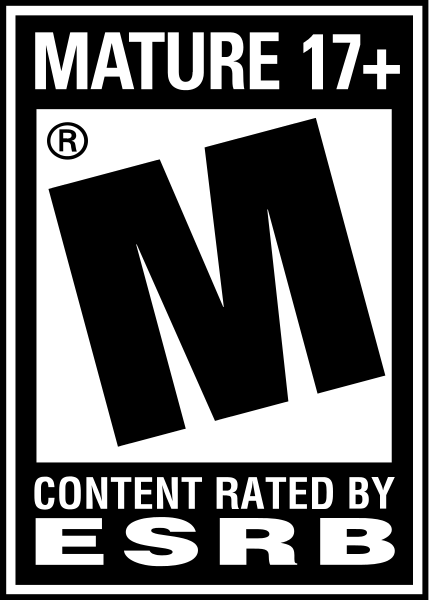
Ubisoft Montreal
Adventure
 08/06/09 Ubisoft
08/06/09 Ubisoft  (Add Date)
(Add Date) (Add Date)
(Add Date)
| Owners: | 1 | |
| Favorite: | 0 | |
| Tracked: | 0 | |
| Wishlist: | 0 | |
| Now Playing: | 0 | |
Assassin’s Creed puts you in control of Altair, a member of a group of assassins. The aim of this group is to prevent war and keep the peace by - you guessed it - assassinating people. But Altair is not a happy camper and he is very much a loose cannon. Very soon into the game Altair makes a mistake which undermines the mission he is on, resulting in the death of a fellow assassin and potentially threatens to destroy their secret society. As punishment, almost all of his weapons (and skills) are stripped from him and he is tasked with working his way up through the ranks once again, regaining the trust of his fellow assassins and their leader.
After a lengthy period where the game holds your hand and teaches you the basics, you are eventually given free reign over a huge game world. Three major cities and the surrounding areas are the key focus of the game. You’re tasked with assassinating nine key figures, although it’s not quite as simple as that. First off, you have to suffer the lengthy philosophical preaching of your master. You’re then tasked with completing a series of side quests in order to gather intel on your target. Then you report back to the ‘Assassin’s Bureau’ in the relevant city before undergoing another torturous dialogue scene, and finally you’re given permission to assassinate the target. The process is quite laborious and worse yet, it’s nearly identical every time.
Each city is split into three sections – a rich, middle and poor district – and to start with only one area within each city is available for you to explore. The side quests you need to complete are scattered around the newest area of the city you’re able to access. The easiest way to locate a side quest is to scout the area, which involves climbing up some of the tallest buildings in the city and then ‘synchronising’ to take in the view. This will then light up all of the side quests in the nearby area on your mini-map. It may not necessarily sound like it, but this brings into play one of the more enjoyable parts of the gameplay in Assassin’s Creed – that of exploring the city and scaling all manner of structures, from church rooftops to guard outposts.
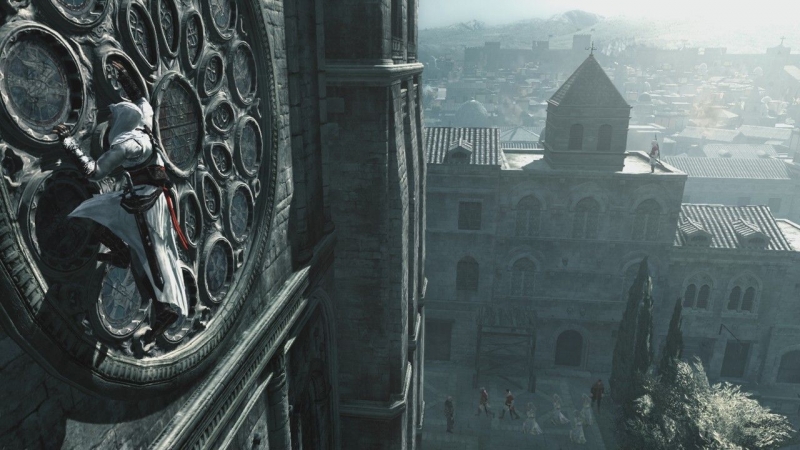
In all, there are five or six different types of side quests to take part in, all of which consist of completing certain basic tasks such as pick-pocketing someone with an important letter or sitting on a bench and eavesdropping on characters discussing useful information. You will have experienced most (if not all) of them before you complete your first assassination. Furthermore, they don’t change much over the course of the game either, and as they aren’t particularly fun the first time around you soon find yourself repeating the same mundane tasks over and over again. For me, the side quests are one of the least enjoyable aspects of Assassin’s Creed, which is unfortunate because they do take up a large amount of your playtime.
Fortunately, one of the more enjoyable parts of Assassin’s Creed is actually getting to the side quests. Moving about the city is a free-flowing breeze. Altair seamlessly leaps from building to building without the need for complex controls. For the player, it’s more a case of running in the right direction and deciding when and where to vault off of buildings and across rooftops so as to keep your momentum going. Climbing up the walls of buildings is similarly accessible and also enjoyable. Almost any building can be scaled and once Altair begins his climb it’s very much a case of just using the analogue stick to guide Altair to the next ledge or piece of uneven stonework - the game will typically do the rest for you, although you can also press the jump button to reach objects that are further away. Other than that, it’s quite a simple and relaxing task.
Assassin’s Creed impresses a great sense of scale upon the player. All of the cities are heavily populated and full of structures for you to climb. Climbing up to the very top of the largest building in each city is a great experience, and you can really feel Altair advancing away from the city below as he climbs. When you finally reach the top of the building and climb out onto a lookout point, you can see the entire city and the surrounding areas in all of their glory. Then once you’ve taken in the beautiful view and the sheer size of the world around you, you can leap off the top and fall to earth, where your landing will be softened by a few handily positioned bails of straw.
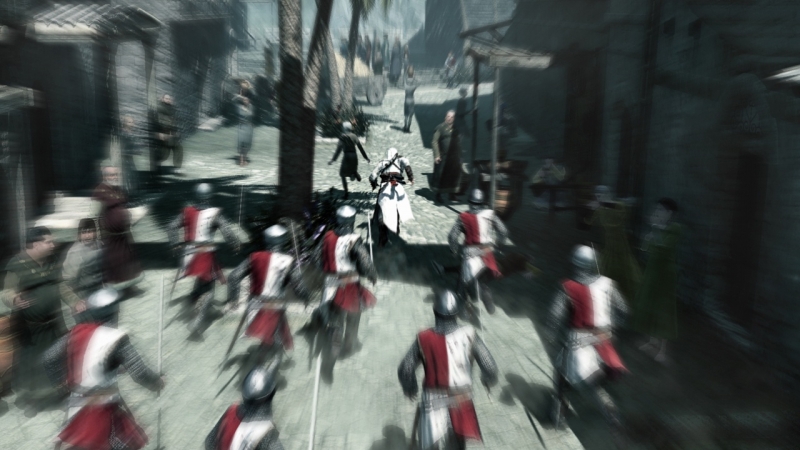
The other key gameplay component is obviously the combat. There’s low profile combat, which allows you to assassinate targets and kill the troops patrolling the city in a stealthy manner, and there’s high profile combat, which typically turns into long drawn out sword and knife fights with groups of guards (unless you choose to run away from them and hide). By far the more enjoyable of the two are the stealth kills. Here you can throw blades at enemies from a distance (which is particularly useful against guards patrolling the rooftops) or you can move closer to your target and assassinate him with your hidden blade. Hidden blade kills are particularly satisfying; you’ll approach your target from behind and then drive the blade into his body in concert with a loud swish of metal that reverberates out of your speakers. Sometimes the guard will be dispatched quickly and quietly, but other times they’re left screaming in pain on the floor as their blood drains away. This is the ideal way to kill the key assassination targets as well, although unfortunately stealth often plays a back seat during these affairs. You’ll approach your target before being treated to a cut-scene. After that scene you’re then, in theory, free to kill that person in whatever way you so wish. But often the target will inevitably become aware of your presence, and so the set-piece moments in the game can sometimes devolve into clumsy open warfare or chase sequences rather than stealth assassinations.
This brings me on to the higher profile open combat. In these situations your bulky sword and more nimble dagger are the most useful weapons, but they won’t save you from the weary boredom that will often ensue. Open combat is based on an almost QTE-like system of timing and counter attack as you’re typically surrounded by a small group of guards and they will lunge to attack you one at a time. The key is to successfully time your button presses so that you perform the appropriate counter to their move as they lunge forward. You then rinse and repeat this strategy several times until all of the guards are either dead or have fled from battle. The system is very repetitive and these battles often turn into lengthy slogs - not the ideal system for a supposedly fast-paced stealth action game. Furthermore, it also becomes incredibly easy to deal with large groups of guards as soon as you’re familiar with the controls, so these battles become more of a nuisance than anything else. The upside to this combat system is that you’re treated to some very impressive action sequences for the finishing moves.
You can also perform high profile stealth assassinations, which blends the two systems of combat together. For example, if you run towards a guard he will spot you. However, if you manage to pull out your hidden blade and attack the guard before he prepares to defend himself you will be able to score an instant kill. In such a case you will leap through the air and stab him in the neck, and - if no one else is around - transition straight back into stealth mode without being spotted.
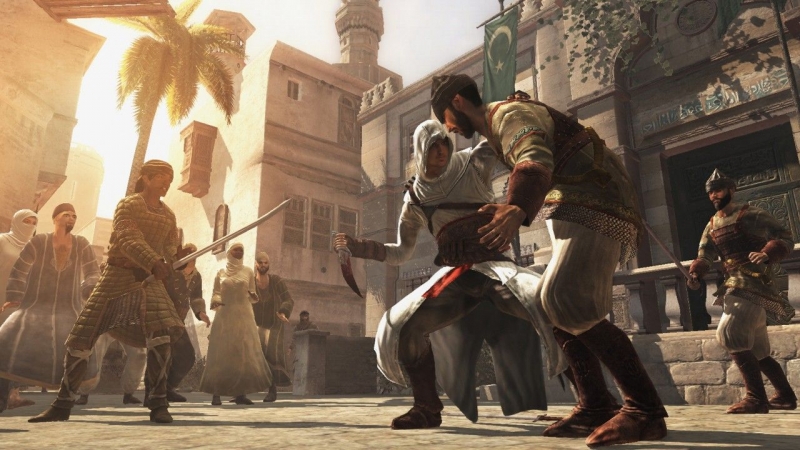
On the whole, Assassin Creed’s entire graphical presentation is superb. Animations are fluid and great to watch. Altair is a suitably cool character (although his personality leaves a lot to be desired) with a well detailed model and smooth, graceful movements. I also found the game to be much better looking in action than in the largely static dialogue and cut scenes. Overall, the sense of a bustling city is conveyed well, and the differences between the three cities and between the different social regions within each city are stark.
The lighting is particularly impressive, and the view from the top of a building is made all the more spectacular thanks to the blazing sun in the distance that will sometimes catch the camera at an angle. The camera itself works well, and although it is sometimes hindered by tight spaces, it will usually snap straight back to the ideal view. When it comes to technical faults, Assassin’s Creed does suffer from occasional screen tearing, but perhaps more immersion destroying is the tendency for freezing. Several times during my playthroughs of both the 360 and PS3 versions, the game froze up and required me to completely restart the systems.
Along with most of Assassin Creed’s presentation, the sound effects are very good. You get the usual effects we’ve come to expect from games today - the clashing of swords, the screams of scared citizens and dying troops, the piercing of flesh with a dagger. You know, the sort of stuff we experience in our everyday lives. One particular effect that always stands out for me in Assassin’s Creed, and which personally acts as a motivation to complete often mundane tasks, is the serene sound you trigger when you collect a flag, complete an objective, synchronise with a view point, etc. Unfortunately, the dialogue isn’t nearly as motivating and as I mentioned earlier it often devolves into a preachy pseudo-philosophical lecture that is forced upon the player. Most of the dialogue scenes drone on for far too long and cannot be skipped. They’re scenes which really break up the action, rarely convey useful information and are just agonising to watch. On the plus side, the voice acting is good, if not also a little out of place in the case of Altair.
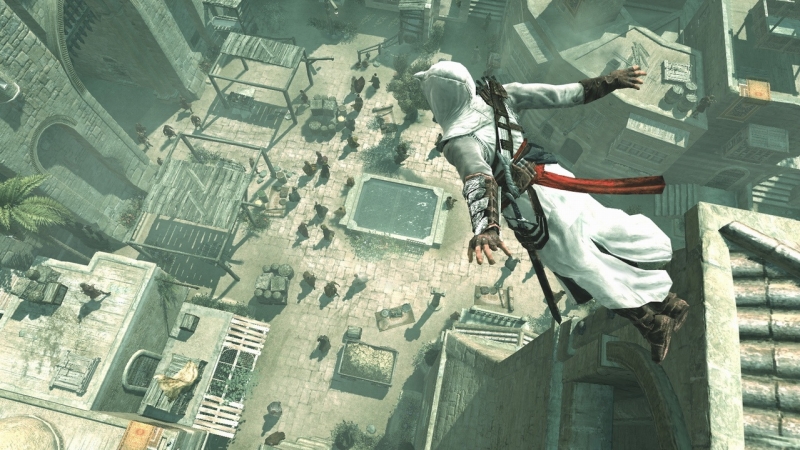
On the value side, Assassin’s Creed is actually a very lengthy game by today’s standards. In part, this is because the three cities and the surrounding areas make up a huge game world that you mostly traverse on foot, and also because the entire story is a long drawn out affair with lengthy dialogue scenes and a plethora of side quests which are repeated over and over again. But it’s also because there’s a lot to do. There are the aforementioned side quests and the dialogue scenes, but there are also the key assassination missions to complete, Templars to kill (they kind of act as mini-bosses), a side story to ponder, and also hundreds of flags to collect (scattered as they are throughout the game).
The problem is I suspect most people will not complete even half of these things, and that is because the game is just so repetitive that you’ll have experienced most of what the game has to offer by the time you get to your third main assassination. This seriously curtails both the game’s replay value and its overall value for money.
Ironically, despite the amount of criticism I’ve leveled at it, Assassin’s Creed is a game that I recommend everyone play, at least for a short while in order to test the water. Sure, it is a repetitive game, the open combat is tiresome, the dialogue scenes are pretentious vacuums, and when the game freezes you’ll be forgiven for just giving up. Nonetheless it is not a bad game - the graphics are mostly stunning, the platforming aspects are relaxing and enjoyable, and stealth killing is almost as satisfying as I had hoped it would be. But the main reason I think people should at least give Assassin’s Creed a small amount of their time is because the concept screamed potential from the moment that very first trailer was released, and even in its present state is suspect that for many this could be the game of the generation.









